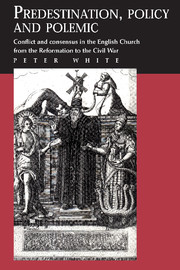 Predestination, Policy and Polemic
Predestination, Policy and Polemic Book contents
- Frontmatter
- Contents
- Preface
- Acknowledgements
- 1 The polemics of predestination: William Prynne and Peter Heylyn
- 2 The theology of predestination: Beza and Arminius
- 3 Early English Protestantism
- 4 The Elizabethan church settlement
- 5 Elizabeth's church: the limits of consensus
- 6 The Cambridge controversies of the 1590s
- 7 Richard Hooker
- 8 The early Jacobean church
- 9 The Synod of Dort
- 10 Policy and polemic, 1619–1623
- 11 A gag for the Gospel? Richard Montagu and Protestant orthodoxy
- 12 Arminianism and the court, 1625–1629
- 13 Thomas Jackson
- 14 Neile and Laud on predestination
- 15 The personal rule, 1629–1640
- Select bibliography
- Index
5 - Elizabeth's church: the limits of consensus
Published online by Cambridge University Press: 11 September 2009
- Frontmatter
- Contents
- Preface
- Acknowledgements
- 1 The polemics of predestination: William Prynne and Peter Heylyn
- 2 The theology of predestination: Beza and Arminius
- 3 Early English Protestantism
- 4 The Elizabethan church settlement
- 5 Elizabeth's church: the limits of consensus
- 6 The Cambridge controversies of the 1590s
- 7 Richard Hooker
- 8 The early Jacobean church
- 9 The Synod of Dort
- 10 Policy and polemic, 1619–1623
- 11 A gag for the Gospel? Richard Montagu and Protestant orthodoxy
- 12 Arminianism and the court, 1625–1629
- 13 Thomas Jackson
- 14 Neile and Laud on predestination
- 15 The personal rule, 1629–1640
- Select bibliography
- Index
Summary
Veins of doctrine
Although no doubt some Elizabethans followed Traheron in claiming that the English Church was doctrinally Calvinist, a more common argument was that the first generation of Protestants, whether Lutheran or Reformed, had all agreed on predestination: there was therefore no good reason to argue about it. Edmund Grindal, for example, writing to Conrad Hubert in 1562, found it ‘astonishing that they [certain divines in Bremen] are raising such commotions about predestination. They should at least consult their own Luther on “the bondage of the will”. For what else do Bucer, Calvin and Martyr teach, that Luther has not maintained in that treatise?’ Hubert would no doubt have agreed: he had recently republished Bucer's early works in an attempt to support Zanchi's position at Strasburg. The claim that there was a consensus, whether Protestant or Reformed, was one way of inhibiting discussion.
Recent historiography has mirrored the change of emphasis: not very long ago it was still common to follow Traheron, but recent studies have reflected Grindal's standpoint. There is considerable evidence, however, of a strong element of wishful thinking in both. The Reformed tradition, as has already been demonstrated, was more diverse than Grindal would have cared to admit. It may be argued, furthermore, first that the doctrinal Reformation generally made much slower progress in the Elizabethan church than has until recently been recognized; secondly, that the extent as well as the nature of Swiss as opposed to Lutheran influence has almost certainly been misunderstood; thirdly, that much early Elizabethan ‘Calvinism’ was carefully moderate in its assertion of predestinarian doctrine.
- Type
- Chapter
- Information
- Predestination, Policy and PolemicConflict and Consensus in the English Church from the Reformation to the Civil War, pp. 82 - 100Publisher: Cambridge University PressPrint publication year: 1992
